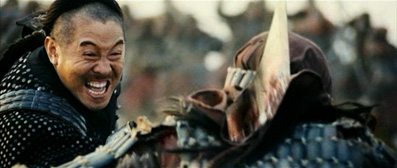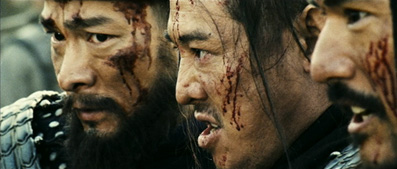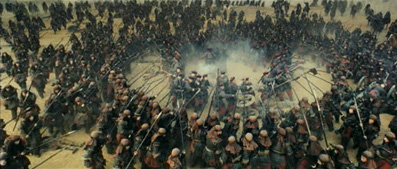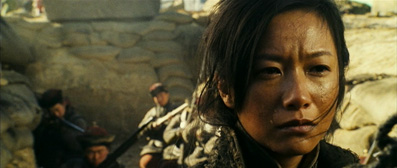|
There's something old fashioned about the recent crop of Chinese historical conflict movies, stories in which the pauses between spectacular battles are devoted to earnest personal dramas, usually involving relationships, friendship and betrayal, almost Shakespearian in their tragedy and rarely ending happily for anyone. In some ways they hark back to the Hollywood historical epics of old, a style recently revived and given CGI makeovers with the likes of Troy, Alexander and Gladiator (they do like those single-name titles, don't they). With the release of Zhang Yimou's Hero and House of Flying Daggers, Chinese and Hong Kong cinema (which are still seen as separate entities in spite of reunification) demonstrated that anything modern Hollywood could do, they could do with a similarly earnest face, but more style.
Since then the quality has varied a little, a good example being Tsui Hark's 2005 Seven Swords, a frustratingly uneven blend of gorgeous visuals, smartly-choreographed swordplay, flagrant borrowings, po-faced seriousness and annoying cinematic technique. One of the latest and best received such works is the multi-award winning The Warlords [Tau ming chong], a film as spectacular and sombre as any of its stable-mates and one that acquits itself well without actually adding anything new to the genre.

The story takes place in mid-nineteenth century Imperial China, where Taiping rebels, operating from their capital cities of Nanking and Suzhou, have captured half the country, a task made easier by the corruption and ineffectiveness of the Imperial Ching Army. A troop shortage has prompted Lord Di, the Ching Minister of War, to recruit pretty much anyone who cares to volunteer, the most hated and feared of this new bunch being the army commanded by General Ho. But history is about to deliver the period's most legendary military leader, General Pang Qingyun (enigmatically played by martial arts superstar Jet Li, the first of a trio of genre-familiar faces here), who we first meet when he miraculously survives a battle that has wiped out the rest of his sixteen-hundred strong army. Rising from the field of corpses, he stumbles exhausted and distraught to an abandoned house, where the kindly Lian (Jinglei Xu) provides him with just the sort of comfort a weary warrior needs. The next morning Lian has gone but Pang is revitalised, and dumping his uniform he walks to a nearby village, where he is quickly pounced on by bandit leader Zhang Wen-Xiang (Kaneshiro Takeshi, an old hand at this from Hero and House of Flying Daggers), who is distributing food to the townsfolk and identifies Pang by his distinctly un-peasant-like boots. Impressed with the General's fighting skills, Zhang introduces him to Er-hu (Andy Lau, also of the Yimou double and who in 2006 starred in historical genre piece Battle of Wits), who turns out to be Lian's husband. In a smart display of tact, Pang decides to keep the events of that night in the abandoned house to himself, but he and Lian continue to eye each other up.
When General Ho's boys arrive at the village and start throwing their weight around, Pang suggests that the local menfolk join the Ching army under Lord Chen, who's desperate for new troops, which would equip the men with the money and weapons to feed and protect their families. Just a teeny uncertain about a man who lost an army and turned his back on military service, Er-Hu and Zhang swear a blood oath with Pang and the three lead their newly formed guerrilla army to raid a Taiping supply convoy. They impress the war council enough to see them kitted out with proper weapons and uniforms, and given enough men and supplies to take control of Shu City and launch a campaign against the Taiping stronghold of Suzhou.

If you're not familiar with Chinese history you may well intermittently have to remind yourself who is fighting who and for what reason. The textual introduction helps, as do the trio of familiar faces when keeping track of identities, particularly when they don uniforms and helmets or spruce themselves up after victory. Genre convention suggests that things are unlikely to work out happily for all and sundry, particularly as Pang and his new brother's wife continue to have the hots for each other. In keeping with what's become the genre norm, everything is played with the straightest of faces with no hint of character humour or light-hearted asides. This is deadly serious stuff that's destined to become even more so once politics keep the army from taking Suzhou and starve them of hope and supplies.
The action, however, is most impressively staged, an early highpoint being the attack on the Taiping Convoy, which survives the current fashion for earthquake camerawork and frenetic editing to deliver a few genuine frissons of breathless action. For sheer spectacle, though, the centrepiece has to be the battle for Shu City, where an Agincourt-like imbalance of troop numbers fails to stop Pang and his brothers from fighting like supermen, a martial arts influence largely unique to the Chinese arm of the historical action genre. High-angle views of the battlefield are borrowed directly from Bondarchuk's War and Peace, CG is used to swell the ranks of both armies and provide quicker-than-the-eye impaling and dismemberment, while the knock-on destruction of enemy canons was impressive enough to make even this cynical git let out a small whoop. The flipside of this large-scale approach is Er-hu's one-man capture of Suzhou city, a bold bit of strategic risk-taking whose success comes down more to his opponent's self-sacrifice and concern for his men than any superhuman skills on Er-hu's part. When Pang rejects Er-hu's promise to spare the enemy soldiers and puts military pragmatism over honour, you know it's going to be all downhill from there.
The Warlords is inspired by historical events, but with much of what actually happened still shrouded in mystery, the filmmakers have something of a free hand to imagine how things played out. Some small liberties have been taken with likely truths, with the use of sandbagged trenches stemming more from director Peter Chan's admiration for All Quiet on the Western Front and a desire to incorporate a contemporary comment on the nature of war than historical fact. Chan's expressed intention of highlighting the drudgery of trench life is undermined a little by the removal of footage from these very sequences (see the deleted scenes on disc 2), a decision possibly forced for the international version (which is 16 minutes shorter than the original) to move the film more quickly to its next set-piece.

The story itself maybe getting its first film telling (or at least it's first big film telling), but dramatically and visually The Warlords is on familiar generic turf, while the spectacle of the large battle scenes is inevitably diminished on the home video format, no matter how big your TV screen. But it's still a solidly made, earnestly performed, fabulous looking (Arthur Wong's scope cinematography is never less than gorgeous) and involving work whose combat sequences deliver on the expectations raised by the name cast, despite the air of pre-destiny that hangs over the heads of the heroic trio. Safe to say that if you have a fondness for this steadily expanding action sub-genre then, for the most part, The Warlords will not disappoint.
As you would expect of a modern big budget production, the 2.35:1 anamorphic transfer is generally first rate, particularly in the contrast balance and the level of detail. No surprises that there's been some major post-production colour tinkering, tinting the image and reducing the palette almost to monochrome in places, all of which appears to be accurately reproduced. Very rarely there is an odd motion glitch on pans and character movements, which could be the result of post-production work on specific shots.
There's a choice between Dolby stereo 2.0, Dolby 5.1 surround and DTS surround soundtracks. All are clear with a strong dynamic range, but the 5.1 and DTS tracks throw some location sounds to the rears and give canon fire some serious punch.
117 Days: A Production Journal (35:22)
A busy and fast moving behind-the-scenes record of the shoot, shot on DV and clearly whittled down from many hours of material. There are some interesting titbits in here, from the crashed lorry that prevents the production convoy from reach its location to the suggestion that scenes were being hastily re-written the night before they are filmed, which may well account for the surprising eight writers credited with the screenplay. Other issues crop up that put the entire production behind schedule, but these are skipped over too quickly for a proper exploration of cause or effect. Frankly this featurette could have easily been double the length it is, which would have allowed a bit of expansion on things only touched on here. Interesting all the same, and there is a short montage of actor clowning about if you enjoy that sort of thing.

Reflections on 'The Warlords' (36:38)
More of the above, in a sense, this is essentially a collection of short promotional EPK featurettes on a variety of aspects of the film, including the costumes, the fire and smoke effects, the director, the actors, the Suzhou massacre, the love story, and so on. Many are only a minute long and tightly packed with behind-the-scenes footage, interview snippets and film extracts, some of which are repeated from the above extra feature. It's here that director Chan states that he wants the violence to be real rather than wuxia styled and wants no superhuman feats. Oops.
Deleted Scenes (22:53)
An interesting collection of cut sequences that although letterboxed rather than anamorphic are in pristine condition, and have been edited and scored in a manner that suggests that the decision to lose them came late. The bulk appear to have come from the siege of Suzhou, including an incident involving a soldier and a small bird that serves as a reminder of Chan's fondness for All Quiet on the Western Front, while two scenes involving Lian help clarify how she came to be on the front line with the troops.
The History Behind 'The Warlords' provides a concise textual overview of the true historical events that inspired the film.
Finally there's the UK Theatrical Trailer (1:26), in which Trailer Voice Man outlines the set-up in deep dramatic fashion ("...but in the final reckoning...their greatest battle...will be against each other...") over some of the more spectacular battle footage, while dialogue is conspicuously absent in the hope that the lazier action fans will not realise that there are subtitles to read.
A solid, well staged historical epic that, in common with a number of similarly well-intentioned attempts to portray the horrors of war, actually makes it rather thrilling to watch. If you're new to the Chinese arm of the genre then if offers a sound introduction, but for those with a few such films under their belt, The Warlord certainly has quality and entertainment value, but lacks that certain something needed to make it really stand out from the crowd. I can't fault Metrodome's 2-disc DVD, though, which looks and sounds great and has a reasonable selection of extras.
|